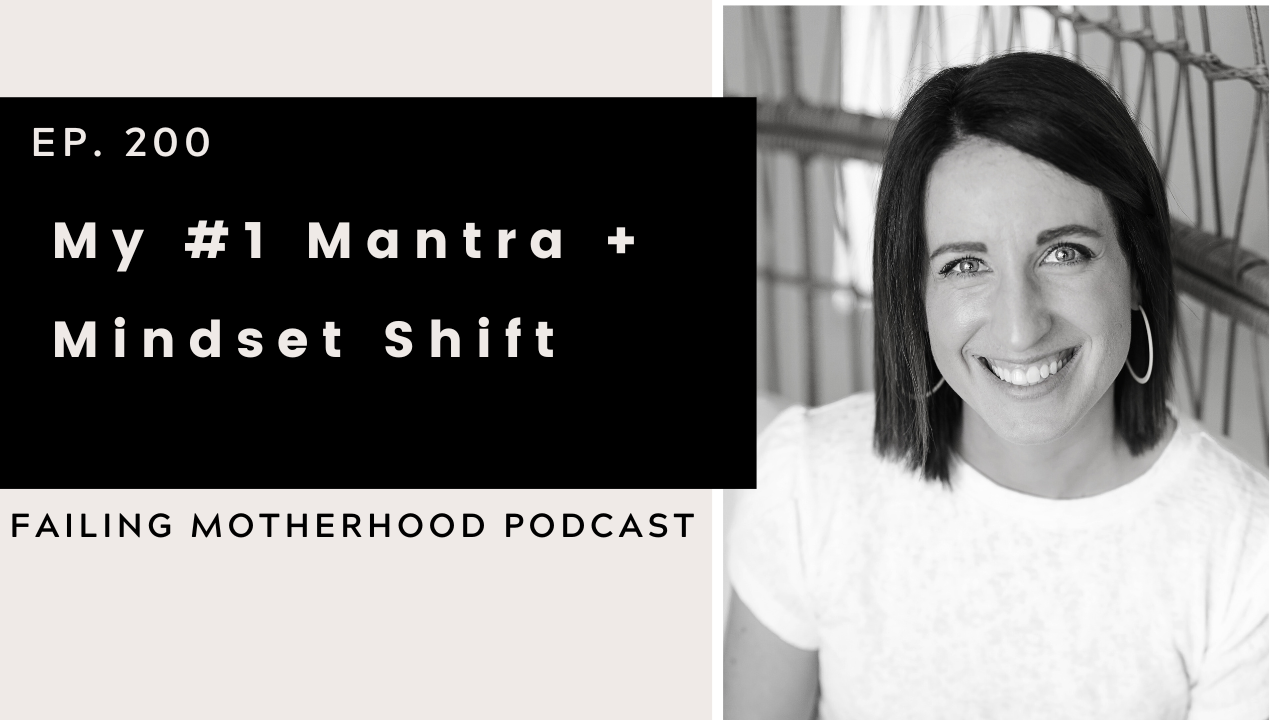My #1 Mantra + Mindset Shift
May 20, 2025
Happy 5th Anniversary of Failing Motherhood!
Welcome to the LAST episode, #200.
If there's one thing I will be known for, let it be this mindset shift. And in this episode, I don't just explain it, but I share a clip from a coaching call where we apply it in real time to a common frustration.
IN THIS EPISODE I SHARED:
- How to recognize when you're having "first thoughts"
- Creative ways to problem solve struggles with cleaning up their own things
- How to take your power back + no longer feel like the victim
DON'T MISS:
- What I'm going to be working on in the future!
// YOUR NEXT STEPS //
#1 - Leave a review in Apple podcasts if you have grown as a parent while listening and share it with a friend to help us celebrate!
#2 - Stay connected through email newsletters by registering for any of these FREE downloads-
- PDF Guide for MORE Patience: www.parentingwholeheartedly.com/patience
- PDF Guide on Managing BIG Emotions: www.parentingwholeheartedly.com/emotions
- Masterclass on the Kind + Firm Approach your Strong-willed child needs: www.parentingwholeheartedly.com/confident
// MENTIONED IN THE EPISODE //
GAME CHANGER: Free Live Class on Tuesday, May 29th - register here: https://www.parentingwholeheartedly.com/game-changer
// CONNECT WITH DANIELLE //
Website: parentingwholeheartedly.com
IG: @parent_wholeheartedly
APPLY: parentingwholeheartedly.com/apply
START HERE:
CALM + CONFIDENT: THE MASTERCLASS
Master the KIND + FIRM Approach your Strong-Willed Child Needs WITHOUT Crushing their Spirit OR Walking on Eggshells
*FREE* - www.parentingwholeheartedly.com/confident
TRANSCRIPT
Danielle Bettmann 0:04
Ever feel like you suck at this job? Motherhood, I mean. Have too much anxiety and not enough patience? Too much yelling, not enough play? There's no manual, no village, no guarantees. The stakes are high. We want so badly to get it right, but this is survival mode. We're just trying to make it to bedtime. So if you're full of mom guilt, your temper scares you, you feel like you're screwing everything up, and you're afraid to admit any of those things out loud - this podcast is for you. This is Failing Motherhood. I'm Danielle Bettmann, and each week we'll chat with a mom ready to be real, showing her insecurities, her fears, her failures, and her wins. We do not have it all figured out. That's not the goal. The goal is to remind you, you are the mom your kids need. They need what you have. You are good enough, and you're not alone. I hope you pop in earbuds, somehow sneak away, and get ready to hear some hope from the trenches. You belong here, friend, we're so glad you're here.
Danielle Bettmann 1:14
Hey, it's Danielle. Welcome to our 200th episode on the fifth anniversary of the Failing Motherhood podcast. This is the last episode for the foreseeable future. I will never say never, but I'm definitely taking a break from sharing new interviews and episodes for at least the summer, if not for good, because it just feels right and the podcast feels complete. I have grown so much, and so much has happened since 2020. We have had so many compelling and insightful conversations here. I just know this library of wisdom will continue to serve families with solidarity and inspiration for years to come, just by continuing to exist on these platforms, I will be continuing to work with families of strong willed kids in my high level group coaching program, and will be shifting my focus into more video content and maybe possibly writing a book. But before I get into today's topic, my number one mantra and mindset shift, I first want to thank you for being here, whether you just found us or you have been here since the beginning. Thank you for investing in your parenting. Your kids are truly so lucky to have dedicated parents with the humility to admit they don't have it all figured out, and they are worthy of resources and support to make their good intentions their reality and take their influence seriously. I commend you so much for that, and you should feel so proud of yourself. If listening to this podcast and hearing the intro and knowing you're not the only one who feels like they're failing on a daily basis has benefited your parenting journey, I would be so grateful if you leave a review on Apple Podcasts so more parents are able to find it in the future. Celebrate this last episode with us by posting a screenshot to your stories as you listen, or by sharing the podcast with a friend. Lastly, I am really excited to be hosting a live class. I haven't done this in two years. Next week, May 27, if you are looking for a way to get to know me and how I teach better, and you need a game-changing tool in your toolkit, I am going to be holding your hand and helping you master it in just one session. It's called Game Changer, and all of the details will be in the show notes on how to register. Again, 100% free, because I hope this isn't goodbye, and instead, see you later, and all the tips that I do share in these live sessions and my email newsletters. And of course, the one thing I tell you in every episode, if you have a strong-willed child, or wonder if you have one and want to unlock better days, making them inevitable, then first download my Calm and Confident Master Class at parentingwholeheartedly.com. Watch it with your partner, and your life begins on the other side.
Danielle Bettmann 4:20
Today, this topic is one that really feels like a culmination of the six years that I have devoted to this work so far. And if I am known for nothing else, I want it to be this, one mantra, one lasting thought. One thing that I really want to soak in and have you sit with and permeate your thoughts and your mindset, and a multitude of moments, can come up so often. What I have realized in having so many conversations with clients and doing so many of these interviews, and having so many of these like circumstantial problem solving, tweaking, and troubleshooting moments with families, is that we often jump to moral conclusions, right? Having that guilt have the meaning that is: we messed up. We are not doing our due diligence. We are bad parents. We are failing, right? I'm not a good parent or a good parent to this kid, and then, in the same way, jumping to moral conclusions about our kids' behavior, they messed up, they're having a hard time. That makes me jump to that must mean that they think they can get away with these bad behaviors, which makes them a bad kid. And now I'm a bad parent because I have a bad kid, or if I'm a bad parent, I'm creating a bad kid. And so we just jump to these binaries of good, bad, win, lose, fail, succeed, and we make a lot of meaning from these microcosm moments. And what it truly, truly, is, and what is such a more empowering shift, is that it's not a moral failing, it's a problem to solve.
Danielle Bettmann 6:23
When you reframe that moment that you got the note home from daycare that says that your kid bit another kid, and all the guilt and the shame that just hits you like a lightning bolt in that moment, it's not a moral failing, it's a problem to solve. When your kid says the worst things they can possibly think of at the height of their anger and dysregulation, and they tell you that you don't love them, or they don't feel loved at your house, and they're a bad kid. Oh, the way that that sits with you as soon as you feel safe enough to challenge your own thoughts, reframing to it's not a moral failing, it's a problem to solve, and then being able to take a step back and actually think critically and logically with a set of tools and a open ended amount of solutions at your disposal, feeling like you can take your power back and solve the problem at hand. If we just took that one piece of advice and ran with it, I promise you your experience of parenting would change. It does not mean that our triggers will go away, or that those first thoughts that we have, those split-second reactions, those scary conclusions that we jump to, the fears that creep in, the anxieties we have for the future, those aren't going away.
Danielle Bettmann 8:03
We are going to have those first thoughts, and we take our power back by choosing what we do with those thoughts and what our second and third and fourth thoughts are, and when we know already ahead of time, what we want to shift into thinking it's a lot easier to take that next step forward and build much more positive momentum, not beating ourselves up being impossibly hard on ourselves for having that first thought, but instead saying, I'm going to choose a better one for my second or third thought, and that can be that thought, this isn't a moral failing, it's a problem to solve.
Danielle Bettmann 8:48
Now we talked about this on a recent call, and I took a few excerpts of what I shared in that conversation, and we ended up breaking down this one particular problem around a frustration and a resentment that a parent held about their kids not cleaning up and picking up at the end of the night, the expectation was that whatever they got out, they would put away. And that is a reasonable expectation, and it was continuing to be a struggle where Mom would have to step in, or Dad would have to help, and it didn't feel fair, it didn't feel right, and this parent brought this problem to the call, and so we talked about how that strategic problem solving can come in with this particular issue, and then summed up the mindset again. So I'd love for you to just take the next 10 minutes listening to this example and then immediately apply this to your parenting today.
Danielle Bettmann 9:50
The next issue that comes up, the next circumstance that's challenging, is being able to, as soon as you can catch yourself, shift to this thought. It's not a moral failing, it's a problem to solve, and then help yourself, take your power back. And there might be several problems to solve, and there might be several different solutions you have to move into, but you can. And when you do things improve. You feel better, they feel better. And when you feel better, you do better. You have the power to shift the momentum in your house. You are not at the mercy of these problems. You are the problem solver.
Danielle Bettmann 10:41
Ultimately, something that feels like you are doing the heavy lifting on the energy and excitement and novelty and all of that, like that is essentially unsustainable long term. You can do that every once in a while, and that's great when you have the energy, too. But ultimately, you want to find ways of being as a family that meet your needs without issue, on an ongoing basis. The main reframe that I would suggest is that we want to put things into that binary of either they're listening or they're not listening. And what I would reframe that to is either they're able to cooperate without a problem, or there's a problem to solve. And at this age, when they're two and a half and four, unfortunately, more often than not, there's going to be a problem to solve. Now they can be very one-off exceptions to the rule, easy to solve things that affect cleaning like they're overtired, they're, you know, already at each other's throats because of something unrelated. You had a really long day at work. Those are all still problems to solve, but they're in and of themselves, in their own silos. We have plans for those. What we hope to be able to have the insight and awareness into is when there's a pattern of unsustainability that, too often for my capacity and sanity, there's a problem to solve here, and that is draining my effort and energy, and it feels unsustainable. So when you can sense that pattern, you really, really, really want to be able to name that, pull back and say, what else is going on here? There's got to be a deeper root issue, and it's not going to be one that I can just kind of Whack a Mole, throw a shiny new, glittery thing on and call it a day. And for your house, there is probably something to reset with cleaning expectations and logistics around cleaning, as well as what feels like the expectation that you have that feels unmet long-term.
Danielle Bettmann 13:03
So that can have a very open-ended option of solutions that come in. So I'm going to name off a couple random examples that could be shifting to a earlier time in the day, or a mornings only, adding it to the mornings routine, you know, short cleanup, or several short cleanups throughout the day, because it seems like your family kind of burns out at 6:30 and cleaning is just always going to be a problem just because of the time of the day and the set time and the routines. And, you know, it's really hard. You need more executive function to do something you don't like at a time of day that you're already burnt out, which is why bedtime is the hardest thing, right? But because of our parenting, you know, we're on fumes, so that could look like shifting to more of everybody helps out Saturday mornings. We reset for the week, and then we have an earlier check-in, where we have to clean before dinner. And then whatever, you know, gets out afterwards, that can sit for the night or something like, how do we create routines that we can as a family be more successful with, given the limitations that we have, and how can I use my environment to set that up more for success? And that is probably going to lean towards less to maintain is easier to maintain. Nine times out of 10, our kids do have more toys than they have the tools to maintain, and so we are left to choose to either pick up the pieces and fill in that gap or eliminate that problem from being a gap. And that is probably way less out than we think. Where, instead of a bin of cars, there are three cars on a shelf, you know, things like that. That is absolutely worth it to pair all that aside so that when it does come to that time of cleaning during the day, you are able to still hold that expectation that this was your mess. You are, you know, held accountable for cleaning it up. I don't have to step in all the time, always, and keep you on task. And it's easier for you to actually complete that and complete with that within the boundaries, because it's the three cars that go back on the shelf that have a little label, maybe even one that says cars. That's why preschool classrooms have, you know, very clear organization, you know, picture labels, all those things are so that the kids can actually do it.
Danielle Bettmann 15:49
And at home, essentially, the boundaries are more casual. So that does make it more challenging, even though it feels like reasonable expectations, there's just a lot more going on at home, dynamically. So, naming that, working to zoom out and then shift, like, how do we rethink our expectations overall? How can we use the environment to support us, back us up? How do we set ourselves up for more success within the parameters of kind of what we know as a family works for us and what doesn't, and then how do we build on that foundation with a few more, maybe structured novelty tools? And I heard of one the other day, and this is again, one of those where it's like, it's not going to solve all the world's problems, but falling into a sustainable system overall, could definitely be a back pocket kind of thing, and it was designating a resident stuffed animal, like a Squishmallow that is the cleaning surveyor, like the person to impress, the person that evaluates the quality of your work, and so you set them up on like a pedestal or like a corner, and then say, Okay, this room needs to be cleaned to his liking. And when we're done, he's gonna check our work and see if there are any issues. And if he sees some issues, we're going to have to fix those issues. And again, like there's a whole lot about that in the playfulness part of the course, but it's like they would rather, and can take criticism, constructive criticism, from a stuffed animal, than they would from us directly. So we can use that to our advantage by creating a middleman sometimes when there doesn't need to be one for us to be more psyched up for success, to be able to leverage still what needs to be said in a way that it's going to be heard without backfiring and creating more in sustainability.
Danielle Bettmann 17:54
So, to answer your question directly, solve the problems when they come up. So the mindset that you want to have is not that he's not listening. He's not cooperating. It's okay. There's another problem to solve here that helps you continue to stay in your power of being the leader and having control, to identify and solve said problem, rather than finding yourself a victim of the circumstances, feeling like, Oh no, I didn't expect or predict this. Now I'm on my back foot. I don't know how to handle this, and then falling into they're their one dictating the pace, you know, they're setting the mood, they're setting the time frame. And now I'm just over here, like, woe is me. No, I can identify the problem, work to solve the problem when a new one comes up: okay, we have another problem to solve here, and that's okay. And then always trying to find, is there a bigger theme here that I can solve with one solution by taking a step back, and when you think of it in that way, it's much more objective. So it requires you to take some emotion out of it. It requires you to take, like, a step back from your identity and your worth as a parent and everything being wrapped up into it, and much more logically, helps you feel like, okay, I have tools. What might work? What can I try? You know, the scientific method that feels much more doable, even to a burnt-out brain, than just feeling like, well, I'm the worst. He's the worst. There's no hope. You know, here we are.
Danielle Bettmann 19:38
So then everything you can do for your mindset and for your perspective that helps you not be in that head space of helplessness and powerlessness is the prerequisite, because as soon as you find yourself with your back against the wall, you're going to jump to more desperate measures out of survival mode as a parent, and that's human. And you know, nobody's immune to that. It's not a moral failing, it's a problem to solve.
Danielle Bettmann 20:10
Thank you so much for tuning in to this episode of Failing Motherhood. Your kids are so lucky to have you. If you loved this episode, take a screenshot right now and share it in your Instagram stories and tag me. If you're loving the podcast, be sure that you've subscribed and leave a review so we can help more moms know they are not alone if they feel like they're failing motherhood daily, and if you're ready to transform your relationship with your strong willed child and invest in the support you need to make it happen -schedule your free consultation using the link in the show notes. I can't wait to meet you. Thanks for coming on this journey with me. I believe in you and I'm cheering you on.



